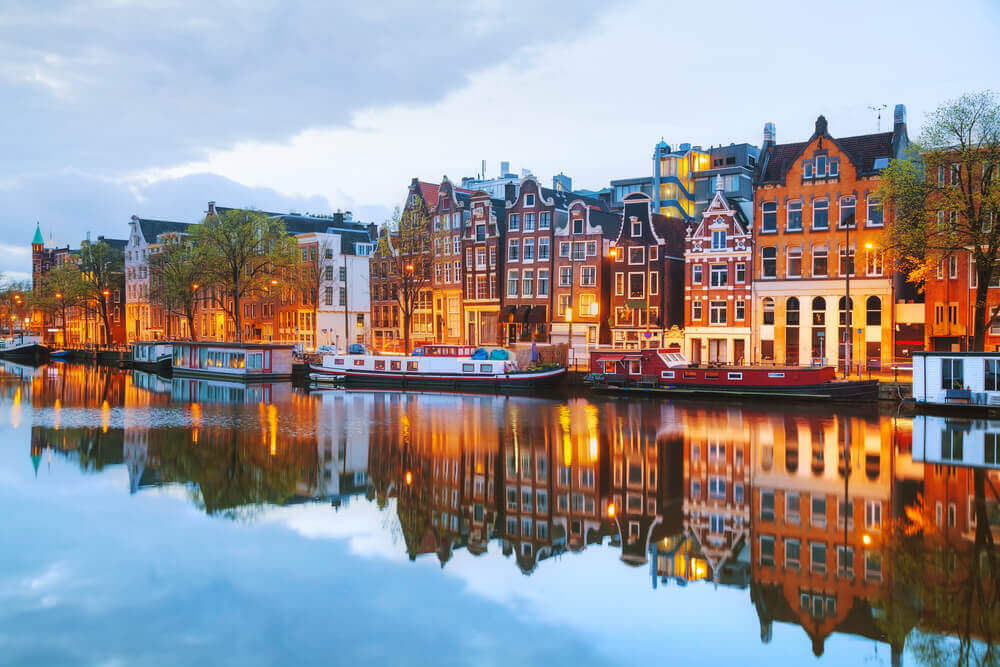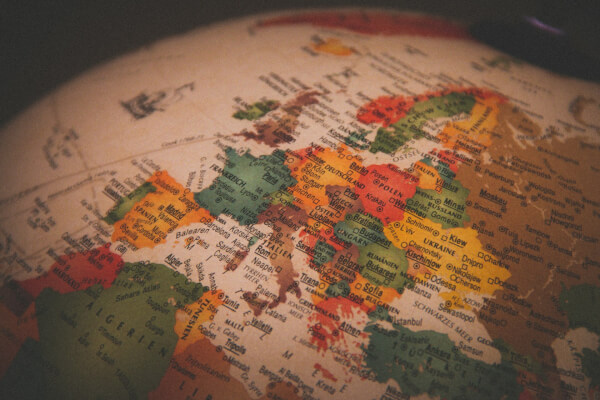Using Lyca Mobile abroad
Read our handy guide on using Lyca Mobile abroad, covering everything you need to know about international roaming with the network.

Today, when many of us live for our holidays, it can be easy to take those two weeks in the Mediterranean sun for granted. But if things go wrong this year – lost bags, cancelled flights, a villa that doesn’t quite exist – you can always console yourself that at least you’re taking a holiday at all.
For most of human history, life wasn’t just nasty, brutish and short, it was entirely unadorned by sun-loungers and guidebooks. Most people barely left their native villages, and certainly never ventured abroad. To put it bluntly, there were no holidays.
It’s true, of course, that a few rich Romans had summer villas in the Bay of Naples, and that medieval Christians liked to go on a pilgrimage. But holidays as we know them really began during the eighteenth-century Enlightenment, when rich young men set out on the Grand Tour across Europe, sampling historic sights, improving views and the hospitality of the local… well, let’s call them entertainers.
It was during the Victorian era, though, when holidays really took off. Thomas Cook’s pioneering package tours began with a railway excursion to the glamorous destination of Loughborough, embarking with the inspirational cry: ‘Three cheers for Teetotalism and Railwayism!’
Trips to the Great Exhibition followed, and soon Cook’s passengers were on their way abroad. More bohemian travellers braved the foul-smelling waters of Germany’s ground-breaking spas. But whatever their background, all right-thinking Britons then agreed on one thing: there was nothing worse than a foreign ragout.
During the twentieth century, holidays became more democratic than ever. Nature walks, seaside resorts, camping trips and caravans loomed ever larger in the national conversation, from the delights of Blackpool’s Big Dipper to the knobbly knees contests at Billy Butlin’s regimented holiday camps.
For a few years, either side of the Second World War, Butlin’s hold on the British imagination seemed unassailable. But then came Spain’s General Franco, desperate to launder his dictatorial reputation and attract some much-needed foreign currency. And by the early 1970s, legions of British visitors were pouring into Benidorm and Torremolinos, beside themselves with excitement at the prospect of the sun, the sand and the unfinished hotels.
But ever since the beginning, tourism has come at a cost. The Grand Tourists carved their names into ancient stones and came home with suitcases bulging with loot. High-minded Victorian snobs moaned that their beloved spa towns were being ruined by hordes of middle-class philistines. Connoisseurs of Spanish art shuddered at the sight of the mobs on the sands of the Costa del Sol. And all of them, without exception, complained about being ripped off, as canny locals spotted the mismatch between the depth of tourists’ local knowledge and depth of their pockets.
The more we travel, of course, the more we recognise the truth of top travel agent Jean-Paul Sartre’s maxim that hell is other people. Fancy a trip to the Acropolis? Good luck navigating the crowds on your way up that hill. Keen to see the Colosseum? Don’t forget to check out that recent carving proclaiming Ivan’s love for Hayley.
Machu Picchu? The Pyramids? Angkor Wat? Wherever you choose, watch out for the unlicensed guide, the pickpocket in the crowds, the oddly over-solicitous stranger at the bar. Above all, expect to queue. And in case you’re wondering, history doesn’t offer any tips how to cope with all this. There’s no password, no secret handshake. Even if you’ve written the book on the Mona Lisa, you have to stand in line with everybody else.
That said, I do think we can all travel a bit more cleverly – and on my podcast The Rest is History, my co-presenter Tom Holland and I set out to prove it. We kicked off our own little Grand Tour with trips to Amsterdam and Paris, recording historical guides to some of the cities’ landmark moments. And in the course of our journey, we compiled one or two tips that will enable you, too, to travel like a historian. What an enticing prospect!
First, do some swotting. You don’t need a PhD in Classics to enjoy Crete, but reading a book or even just an article or two on the Minoans can make the great palace at Knossos more than a few repainted frescoes and a pile of rubble. Even better, why not a podcast? Download it before your flight, and a couple of hours later, you can pose as an expert. Much better than a tinny audio-guide, anyway. And once you’ve got the facts at your fingertips, you can happily wave away all those touts at the entrance.
Next, pick a period. You’re not going to get a grip on the entire history of a place, so concentrate on a particular era. In Paris, for example, we focus on the heady spring of 1968, the heyday of student protests against President de Gaulle. So when you stroll through cobbled streets of the Latin Quarter, past all the bustling bars and cafés, you might not smell the tear gas, but you can at least imagine it. Peer up at the Elysée Palace, and you can easily picture de Gaulle, head in hands, contemplating the prospect of revolution. And for a souvenir, what better choice than a 1968-themed fridge magnet? As the student slogan goes, Be Realistic, Expect the Impossible.
Don’t only take in the obvious sights. With some light pre-holiday swotting, you should have a good feel for the sights ignored by the ill-informed and ill-focused. Most visitors to Amsterdam, for example, barely bother with the city’s exquisite hofjes, peaceful courtyards fringed with almhouses. Yet for those in the know, they’re absolutely wonderful. In particular, check out the Begijnhof, a peaceful courtyard beside a chapel that marks the Miracle of Amsterdam, a stomach-turning tale of undigested bread that turned a sleepy fishing village into a leading pilgrimage destination.
And since you’re more knowledgeable than those tourists of old, you should avoid being ripped off. If you’re next to a major sight, for example, keep your money in your pocket. The restaurants near the Champs-Élysées offer the worst food in Paris. Think about how you’re spending, too. Museum tickets, souvenirs and refreshments can quickly mount up if you’re spending with a traditional bank card, thanks to exorbitant exchange rates and ATM fees. I always rely on my trusty Wise card, since its low up-front fees mean you spend like a local, not a tourist.
Finally, and perhaps most importantly, don’t overdo it. Not only are you on holiday, you’re on holiday in the twenty-first century. There’s no obligation to attend a temperance meeting or enter a knobbly knees contest – unless, like Tom Holland, you really want to. So yes, see some sights. Drink in the history. But walk around, have a long breakfast and a cocktail or two. (Even a cocktail at breakfast, if you fancy it.) Relax. After all, the real wonder of history is that you’re on holiday at all.
To learn more about how to spend like a local and travel like a historian - and read Tom and Dominic’s guides to Amsterdam and Paris - head to www.Wise.com/restishistory
*Please see terms of use and product availability for your region or visit Wise fees and pricing for the most up to date pricing and fee information.
This publication is provided for general information purposes and does not constitute legal, tax or other professional advice from Wise Payments Limited or its subsidiaries and its affiliates, and it is not intended as a substitute for obtaining advice from a financial advisor or any other professional.
We make no representations, warranties or guarantees, whether expressed or implied, that the content in the publication is accurate, complete or up to date.

Read our handy guide on using Lyca Mobile abroad, covering everything you need to know about international roaming with the network.

Read our handy guide on using giffgaff abroad, covering everything you need to know about international roaming with the network.

Many travellers miss out on the opportunity to claim back VAT refund. Dive into this guide and discover how to maximise your VAT tax refund in Europe.

Sit tight, because you and I are about to fall into a trip together (get it?!). After all, it is *that *time of the year, when orange becomes the new black,...

This article gets you one step closer to your affordable vacation in Iceland by detailing your options for VAT refund in Iceland as a tourist.

Check out our in-depth guide on everything you need to know about buying a prepaid Barbados SIM card, including different providers, pricing, and features.